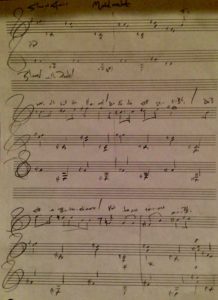The Improvising Pianist: Spontaneity and the 24 Hour Piece
 Ever try to write a complete, self-contained piece at one sitting?!?
Ever try to write a complete, self-contained piece at one sitting?!?
For most of us, this kind of precociousness probably brings up images of someone like Mozart. “I couldn’t possibly do that” is the most reasonable response from most musicians.
Or is it?
The western classical tradition of music making is centered on musical literacy and the printed page, but we sometimes forget the thriving improvisation tradition that coexisted for centuries. Beethoven and Mozart were first and foremost known as incredible improvisers. Bach was an amazing improviser. Likewise with countless others – every performer worth their salt was expected to improvise competently (ask any organist about this tradition).
Of course jazz musicians will yawn at the concept of the ‘uniqueness’ of improvising, while we score-obsessed classical musicians still see this as some exotic bird that mostly ‘others’ indulge (probably because they were just born with it, the thought process goes).
But what if we made improvising and composing a regular part of our musical life?
When I first started composing, I did so largely without the benefit of formal studies, which freed me from the kind of over-analysis that can often stifle creativity in its tracks. Blissfully free, I simply found interesting ideas at the piano, repeated them, then tried to create more complex textures as I slowly but surely developed my own language and style.
Like a Jackson Pollack action painting, I’d throw myself at the keys, creating dissonant improvisations that resembled those created by free jazz great Cecil Taylor. Other times I’d indulge myself with beautiful harmonies using more traditional diatonic chords and sound combinations.
Somehow as I got more adept, the idea of trying to sit down and improvising a complete, self-contained piece in the form of a piano miniature took hold.
Could I do it?!? Could I really spontaneously improvise and perform a legitimate 2-3 minute piece of music that had its own internal logic and made sense as a miniature?
Mostly, yes!
With age and professionalism comes the development of craft and a slower approach. This is most assuredly a good thing. But what do we lose when we give up spontaneity? What do we lose when we stop focusing on creating that instant connection to music based on the very physical (and visceral) act of improvising?
I think about this often, and find myself trying to balance and integrate these left and right brain approaches.
Here are two examples of pieces that started out as successful 24-hour improvised pieces. The recordings here are clearly not the originals – in both cases I took the initial results, put them into a notation software, and made meaningful edits that improved the overall cohesiveness of both works.
The first piece Mondnacht is a song for soprano and piano written as part of my ongoing composer residency with San Francisco’s LIEDER ALIVE! arts organization.
The second work is a solo piano piece I created as part of a planned group of miniatures created spontaneously and then uploaded onto social media sites (hence the name Facebook Miniature #3).
As musicians, we need more of this.
We need to be able to connect with our art at a moment’s notice, warts and all.
Give it a try – you just might be surprised with the results.


